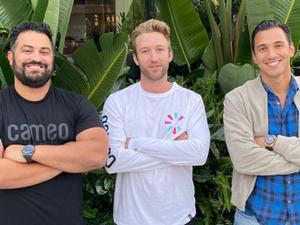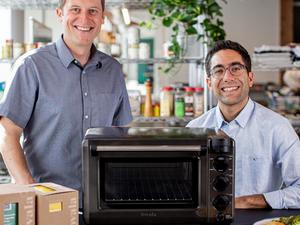It's been a big year for Chicago tech companies. From IPOs, to successful exits, to a record number of VC investments, Chicago is proving itself as one of the up-and-coming tech hubs in the U.S.
But if Chicago is going to build on the momentum it has generated over the last few years, the city's younger startups are going to need to continue to grow and contribute to the ecosystem. So we've rounded up 15 startups that we're keeping our eye on in 2015. These aren't necessarily the companies that have raised the most funding or have the best chance to go public, but they have developed truly innovative ideas and are poised to expand their business and make an impact in 2015.
Here are Chicago Inno's 15 startups to watch in 2015:
1. Opternative
Disruption is the buzziest of buzzwords in the tech community, but Opternative has already become a disruptive force in the eye care industry and it hasn't even officially launched yet. The company offers online refractive eye exams and lens prescriptions in just 20 minutes, and you can do it right from your computer at home. After taking the exam, the prescription is emailed to you, saving a trip to the eye doctor. And at $30, it's cheaper, too.
So naturally, traditional eye care professionals are freaking out. Their argument is that a computer can't possibly be a replacement for a trained professional who has years of experience diagnosing glaucoma, cataracts, brain injuries, etc. But Opternative isn't trying to replace eye doctors; it suggests you get an official exam once every two years. But for those who just need a new eyeglass prescription, Opternative is a game changer. It's launch is expected this winter.
2. LyteShot
From pinball to coin-operated games, Chicago has a rich, but forgotten, history as a leader in the gaming world. LyteShot wants to put Chicago gaming back on the map, and it just might transform the industry entirely. The company is creating a new gaming market segment called "live action gaming" that uses a mobile app and sensor-based device so users can play games in physical spaces.
LyteShot's first game, Assassin, is an action shooter experience that enables players to go into their city or neighborhood, search for friends, and fire the sensors once a target is spotted and in-range. After a "win/loss" has been registered, the player's score is recorded and he or she is automatically sent a new assignment. And so far, industry leaders are paying attention. LyteShot joined Microsoft and Samsung as a finalist at a recent trade show, and Epson - a maker of "Smart Glasses" - reached out to them about exclusively integrating games into their augmented reality accessories.
3. Relief Watch
The World Health Organization estimates that 40 percent of all health centers in the developing world have problems with stockouts, or when a pharmacy runs out of a specific drug. Relief Watch is a platform that allows multinational NGOs to report inventory records and disease cases via text and automated voice calls, since internet connectivity isn't available in all parts of the world. Launched in 2012, Releif Watch uses its cloud platform to track supplies and medical equipment, allowing medical distributors to know what areas need which drugs.
Relief Watch recently signed a contract with Liberia where the technology will be used to monitor the tools and medicine fighting ebola.
4. Innoblative
What if the weeks-long process of radiation could be replaced with a procedure that takes just minutes? That's precisely what Northwestern-born medtech startup Innoblative says it can do. Here's how it works: Innoblative has developed an ablation probe that's used during a lumpectomy after the tumor is removed. The probe is inserted into the breast cavity and delivers heat using radiofrequency electrical signals. Innoblative believes that by using heat to destroy the residual cancer, the probe will eliminate the need for radiation among patients.
The technology is safer, less obtrusive, and less expensive than radiation therapy, Innoblative says.
5. Outernet
Whether it's due to a lack of internet connectivity or content blockers set up by governments, many people around the world are unable to access information they need. Outernet is changing that by repurposing satellite tv equipment and broadcasting information from the web to anyone with an Outernet receiver. The receiver connects to any WiFi enabled device, allowing people to access content regardless of internet restrictions. It's not the same as full access to the web, but rather online programing complied by Outernet. Inforamtion available first will be Wikipedia, Linux distributions, compiled news bulletins, disaster updates, and other educational resources.
The company currently has an Indiegogo campaign that has raised over $300,000. Outernet is often labeled at a New York startup because it has a work space there provided by one of its investors, but its founder Syed Karim lives in Chicago, and the majority of their work is done here.
6. Raise
Raise has been one of the fastest growing Chicago startups over the last two years, but they haven't exactly been the talk of major tech publications. And that's just fine with Raise's founder. The easy-to-use marketplace for buying and selling gift cards has kept a low profile because they've got a business that doesn't need a massive amount of promotion. They've had around 30 straight months of revenue growth, they've added 50 jobs in 2014, and just launched a mobile app. Working in the $115 billion gift card space, Raise is an example of a Chicago startup that seems to be doing all the right things.
7. Breakwater
Breakwater is a proposed $23 million floating island in Lake Michigan. You read that right. Part yacht, part island resort, Breakwater would sit a mile off of Chicago's shoreline. It expects to be 300 feet long by 100 feet wide and will provide guests with a swimming pool, spa, lounge, shops, restaurants, and water taxis. It will be accessible only by boat, and there will be docks for boaters to tie-up. Non-boaters will use the water taxis. During the winter, Breakwater will be pulled to shore and docked and enclosed in a clear dome.
There are legislative hurdles Breakwater still needs to clear, and the company is currently raising the funding it needs to get off the ground. But if all goes to plan, this innovative recreational space could be up and running by 2015.
8. Anarchist
Anarchist is betting that virtual reality is going to be tech's "next big thing." Created by two former Groupon developers and a GrubHub sales person, the Wicker Park startup is building virtual reality software aimed at increasing productivity and collaboration. The company is is creating a virtual reality desktop and developer toolkit, which they believe can change the way people connect. And after Mark Zuckerberg's $2 billion acquisition of Oculus, VR looks to be a major player.
Anarchist believes with the right software that financial traders will no longer need multiple computer monitors; they'll only need an Oculus. Filmmakers, animators, 3D modelers and others working on a film could use the software to collaborate on a project. And teleconferencing could be changed drastically if companies used the software to communicate and work remotely.
9. FanPay
1871 member startup FanPay wants to tackle one of the biggest problems in college sports: payment for athletes. FanPay proposes using crowdfunding to collect donations and pay players, with the idea being that pages would be created for athletes where friends, family, and yes, fans, could donate money. The kicker is that the players wouldn’t be able to receive the funds until after graduation, satisfying the NCAA’s rule of not paying athletes while in school.
Even though it launched just four months ago and hasn't accepted any real money for any athletes, it has already received more than 130 cease and desist letters from colleges and a direct response from the NCAA. FanPay has an uphill legal battle against the NCAA before crowdfunding gets the OK, but there may be a workaround where FanPay doesn't need approval. If the athlete is unaware of the campaign and it isn't operated by the university or the player's family, there might not be anything NCAA can do about it.
10. Keeper Security
Every week there seems to be a massive data breach exposing valuable company information or private personal documents. The need for businesses and individuals to secure digital files is growing fast, and a leader in online storage is right in Chicago. Keeper Security is a password manager and digital vault that uses encryption technology to securely store your website passwords, financial information, and other documents. The company launched four years ago and has gained millions of users annually and as many as 20,000 per day. It also works with close to 5,000 companies, like Nike and Chipotle, who use Keeper to securely store customer data.
Keeper is a zero knowledge security provider that stores your passwords and digital files in a military grade encrypted vault. All you need is one password, or a fingerprint scan, to log in. Keeper it will store and organize all your passwords for all your websites, and it will automatically launch all those websites from inside Keeper and auto fill your log-in credentials for you so you never have to remember a password ever again.
11. SiNode Systems
SiNode Systems develops advanced materials for the next generation of lithium-ion batteries. Its technology charges batteries faster and helps them stay charged longer. SiNode’s technology, developed at Northwestern University, is an advanced battery material made of silicon and graphene in a novel layered structure, which enables game-changing improvements in battery storage capacity and charging speed. SiNode was a finalist at the 2012 Clean Energy Challenge.
12. 640 Labs
640 Labs is making farming smarter. The company uses analytics and cloud computing to collect massive amounts of agricultural information and deliver the data to farmers' mobile devices. It captures data from tractors, combines, and applicators, gathering information such as soil type and weather. The technology allows farmers to gauge performance based on their region, compare productivity in multiple fields by machine and crop, and better store information for improved record keeping.
Update: 640 Labs was acquired by San Francisco farm tech company The Climate Corporation on Dec. 8.
13. SpiderSense
There's wearable tech, and then there's SpiderSense, a UIC-born startup that is doing a lot more than counting your steps. SpiderSense is a suit with 15 modules placed all around a person's body that applies pressure when someone is approaching an object, allowing the user to sense when something is near. It's a perfect device for the blind, but the company says it could also be effective when used by firefighters or other officials who work in low-visibility environments. The technology could also be used on automobiles and bicyclists, so instead of your car alerting you with a beep when someone is in your blind spot, you could feel a vibration on your skin.
14. LifeLine Response
Drones are cool for areal videos and Amazon deliveries. But what if they could help city police officers? LifeLine Response is an app that immediately alerts authorities when you're in danger, and it hopes to soon deploy drones to those same people. Currently it works like this: Users download the app and place their finger on the screen when they're walking alone, entering a dangerous neighborhood, or simply feel unsafe. Releasing their finger from the screen triggers a 20 second countdown, which then notifies police of your location for officers to respond.
If LifeLine receives FAA approval, drones would be activated as soon as the police are notified and will arrive on scene in as early as 15 seconds. The drones would provide real-time video surveillance of the incident that would be sent directly to law enforcement to monitor the situation.
15. AMPY
Born out of Northwestern, AMPY is a handheld device that captures your kinetic energy as you move and stores it so you can charge your phone, smartwatch, fitness tracker, or any other USB-powered device. Walking 10,000 steps, cycling for an hour, or running for 30 minutes will generate enough energy to power your smartphone for 3 hours, a smartwatch for 24 hours, and a fitness tracker for 72 hours. Think about it like using your runner’s high to charge your phone. How cool is that?








